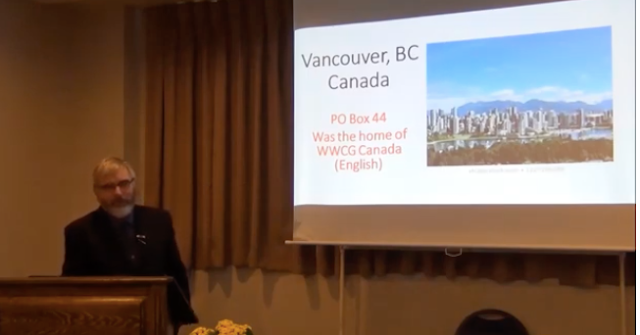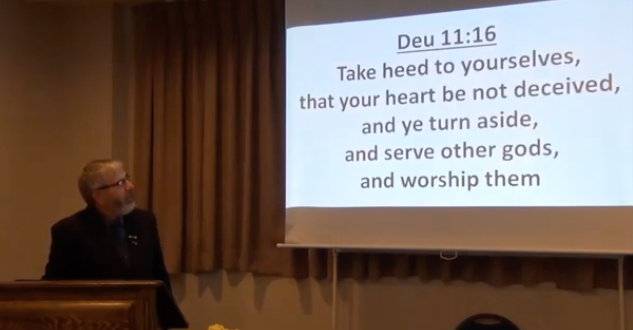Jesus in Prison
An important theological means of preserving The Hierarchy is the subordination of Jesus. If God is hierarchical and Jesus is a lesser being then then there is a philosophical precedent for sorting people into greater and lesser categories as to human worth. “Church trash” is then a valid concept underpinned by the very Doctrine of the Hierarchical God.
Dixon Cartwright interviewed Robert Coulter who had been one of the past Presidents of the General Conference of the Church of God (Seventh Day). And Coulter made a breath-taking statement: “When I grew up in the church (CoG7), it was Arian. It taught the preexistence of Christ, but Christ was not God… Arianism tends to degrade the position of Christ.” At one point, Cartwright seeks clarification on what Coulter meant precisely by Arianism and Coulter stated, in part, “…Jesus existed as a spirit being before His conception in Mary but was a creation of God the Father at some distant time toward past eternity.” The Word who became Jesus was not God but was a created being. This was the theological environment in which HWA’s beliefs were incubated.
In order to maintain the doctrine of the Subordination of Jesus, adherents use a collection of scriptures that pertain to Jesus’ Kenotic state. Jesus did empty himself of his glory to come to earth and become incarnate (Philippians 2:6-7). During that Kenotic interlude such statements as “…my Father is greater than I” in John 14:28 are perfectly valid. But these statements have validity only within a certain transient context. The adherents of the Subordination of Jesus keep Jesus, ideologically, imprisoned in his Kenotic state in order to exalt The Hierarchy.
Jesus the Defender of Church Trash
There is a difference between a hierarchical church government and the hierarchical valuation of human beings. A hierarchical government may have some value but sorting people into a hierarchy based on their perceived human worth is never moral. Yet when there is a strong autocratic hierarchical government, there is a temptation to use the hierarchical principle suited to a physical process in valuing human lives. Jesus knew that such things would happen in human governance, so he issued a New Covenant Law to oppose bad governance.
Imagine someone gets disfellowshipped. This is, in effect, a death sentence. A disfellowshipped person can expect to burn in Gehenna to ashes. The minister may feel confident about the disfellowshipping because he knows that God backs him up. Whatever he binds is bound and whatever he loosens is loosened. So, the minister can’t be wrong. If he made an error in judgment in the disfellowshipping, God will back his decision rather than the reality. This is why The Hierarchy is so powerful. God will back the people at the top of the hierarchy even if they issue a wrong judgement – even if it contradicts what God is in his essence. Fallible humans could in principle overrule God simply by making a mistake. I don’t know that this bizarre scenario depicts, in every point, real circumstances for any denomination. If someone were to have this belief, they would be theologically, morally and intellectually deficient. But it serves here as an example of abusive governing.
The New Covenant Law that Jesus announced in Matthew 18:6 addresses any situation where bad church governance occurs including the practice of disfellowshipping. Jesus said in each of the Synoptic Gospels:
“But whoso (speaking to the disciples, future leaders of the church) shall offend one of these little ones (children symbolizing believers) which believe in me, it were better for him that a millstone were hanged about his neck, and that he were drowned in the depth of the sea (Matthew 18:6).”
This is a New Covenant Law focused on the ministry that serves to regulate any process where church governance may be abused or, in our example above, the process of disfellowshipping. The disfellowshipper (a minister) must be profoundly certain, to the point of refraining if there is the least doubt, that there is not even the slightest bias or ethical shortfall to a disfellowshipping decision – anything that would cause offense. The Law Jesus stated has frightening consequences. It should always be cited in conjunction with the exercise of church governance or the process of disfellowshipping. Unless it is cited, this leaves the minister thinking he has a free hand to operate, to loosen, and to bind, but he does not and the consequences will have a dire effect on his life. Having a disfellowshipping policy without this New Covenant Law being prominently featured is like giving someone a loaded gun to play with and providing no warning.
Matthew 18:18 on loosing and binding does not cancel Matthew 18:6. Christ issued both in the same passage. In fact, Jesus, leads off with Matthew 18:6 in this passage. But Matthew 18:6 operates in conjunction with church governance in general. Therefore, Matthew 18:6 and 18:18 both operate together. This means that if a minister binds an action on a church member, the minister also simultaneously binds himself to be judged by God on the integrity of his decision.
Why is a Hierarchy of Human Worth so Important to Some People?
Why would someone decide to value people as if they were livestock on a farm? I can conjecture. It may convince people to yield to autocratic control. It may reduce people to the level of an anonymous resource. It may be a ploy to exalt a leader or create cult celebrities. Because people relate to each other through The Hierarchy, inconvenient Christian love is displaced. Perhaps, The Hierarchy provides the environment for little tyrants to masquerade as leaders. Whatever, The Hierarchy shifts the focus from God to man. Another person is going to tell you what you are worth instead of God – tell you where you fit in The Hierarchy. Someone might even have the temerity to tell you that the only reason you are in the church is to support The Work financially.
Summary Statement
This is very difficult idea for people who are trapped inside The Hierarchy to understand. To some, the idea may even seem dangerous. It is the idea that hierarchy can work well for some secular processes but it should not be applied to the valuation of human beings. It is an easy idea to understand unless you have been indoctrinated to believe that some humans are intrinsically more valuable than others. Then you will writhe in frustration trying to understand this idea and then finally fall back on the belief that hierarchies are a necessity in nature and, therefore, define how we must value human beings. Just try to get a grip by remembering certain facts from your pre-cult days. Every human being is in the image of God. Jesus is God. Jesus died for everyone. Jesus loves everyone. “For God so loved the world…”.






